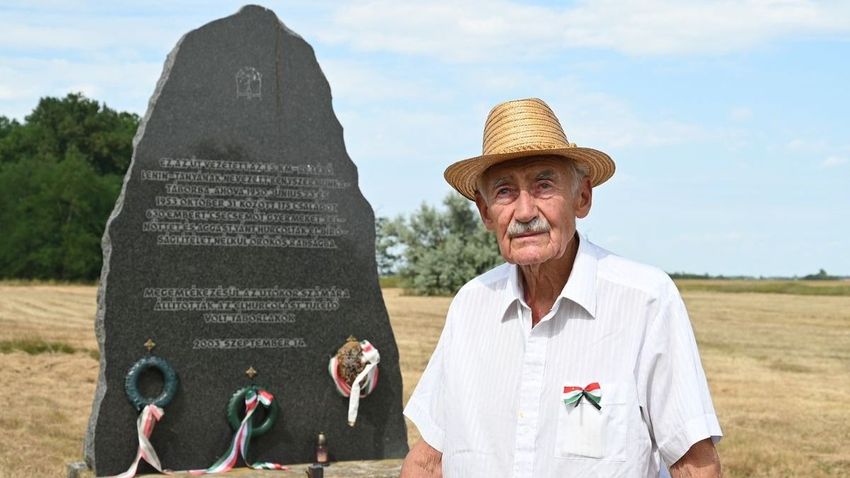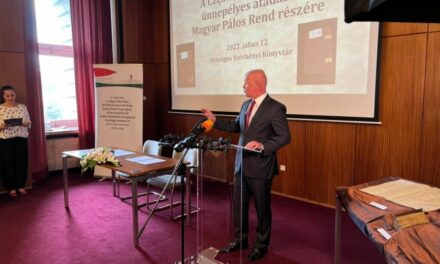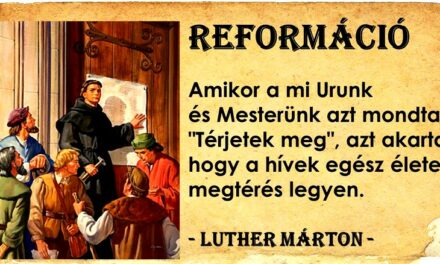In 1950, resettlement to the closed camps in Hortobágy began. The strictly secret ÁVH operation, during which thousands of families were relocated to Hortobágy, began on June 23. We visited the place of detention with József Kajsza, the oldest survivor of the Lenin farm.
Between Polgár and Hajdúnánás in the counties of Hajdú-Bihar, on the side of the national road, almost in the middle of nowhere, there is a large block of granite, where we meet 95-year-old József Kajsza, the oldest survivor of the Lenin farm labor camp. Together with his family, he was imprisoned in this place between June 1950 and October 1953 - without any court sentence.
"What kind of monument is this?"
"It's ours, it belongs to those who were imprisoned on the Lenin farm," answers the old man, wiping his forehead in the summer heat.
"We erected it twenty years ago so that it would always remind the next generations of the inhumanities that happened during communism in this country."
According to József Kajsza, even thirty years after the system change, few people know the tragedy of those dragged to Hortobágy, even though it affected nearly ten thousand people. Their resettlement is often confused with moving to "Kula" families, although the two were different. During the former, the abductees were locked up in state farms guarded by armed men and made to work there. Unlike penitentiary institutions, the care of the inmates here was not guaranteed, they had to work for everything, even their own food. The internment-like resettlement was introduced here by the Hungarian comrades based on the Soviet and Romanian model, in order to rid the country of the system's enemies, the "reactionaries".
The power struck the people living in the western and southern border zones first.
The goal was not only to take the families away, but also to intimidate those who remained. By cutting off the exemplary, opinion-forming intellectuals and peasant society of the small villages, they sent the message that they can do all this with anyone, it would be better if they give up independent farming, give their lands to the commons, and join producer cooperative groups.
In 1948, the leadership of the Hungarian Communist Party still believed that with the lands taken from the kulaks, they had succeeded in creating such an "attractive" situation that the peasants would voluntarily join the producer cooperative groups, but few decided to join. By 1949, only nearly five hundred producer cooperatives were operating, and even those were small, with an average size of one hundred hectares. From 1950, more and more campaigns and intimidating agitations took place in the villages. The deportation of local opinion-forming peasant families - as well as intellectuals, teachers, church leaders, former gendarmes, military officers - also served the purpose of keeping the given social groups in fear and making individual farming impossible. Forced industrialization could not be carried out without dispossessing the peasantry of their land, since the socialist schedules could only be solved with a sufficient number of auxiliary workers and industrial workers. By the end of June 1950, the closed camps in Nagykunság and Hortobágy were established, which housed thousands of families for more than three years.
When we ask József Kajsza about being sent to a labor camp, he just stares ahead. He searches for the words.
Even after all these decades, he finds it difficult to begin the narrative of the most horrific night of his life, which permanently changed not only his life, but also that of his entire family.
On June 23, nine hundred and fifty, after finishing the barley harvest, they went to rest in their home in the Szentirma steppe near Drávafok. At three o'clock in the morning, a jeep drove up to them, with five or six armed Ávós on it, who charged at them, cursing loudly. The residents of Ávós reported that József Kajsza Sr.'s stay in the settlement was worrisome, so they assigned him a forced residence. The father acknowledged this without saying a word, he just said: "No problem, I'm packing and I'm leaving" - but the Ávós showed that it wasn't like that. They were shocked to learn that the order applies not only to the head of the family, but to the entire family, so the younger Kajsza also shared the fate of the head of the family. In a matter of minutes, they lost all their movable and immovable property, and were given only an hour to pack their most necessary items.
In addition to the residents of Ávós, the commander of the Drávafok police station also took part in the evacuation, who, considering the pregnant wife of József Kajsza, tried to help the confused family with packing with well-intentioned advice, so the unborn child's clothes were not left at home either. They hastily tied up what little they could take with them in sheets. The Kajsza family could never return to their home. At the train station in Selly, they were faced with the fact that they were greeted by a long line of fellow travelers in the square next to the station. The families were locked in cattle cars with police escort.
We started our journey into the unknown. We thought they were taking us to Siberia
says the old man. – It was so hot that day too, our train was moving extremely slowly, as our train was constantly being set aside on the open track. It was all monotonous and nerve-racking. Only at Hatvan did they open the doors so we could get water.
It was late at night when their train was stopped near Ohat-Pusztakócs and everyone was brought down into the deep embankment ditch.
"With my pregnant wife and sick parents, we got by with great difficulty." We, young people, were herded into a group by horsemen, just as dogs herd livestock around. These were ordinary, no-man's-day figures who rode around us on horseback. We were huddled together like frightened sheep. Then they set us off into the wilderness, into the dark night.
They marched at least ten kilometers, until in the morning they arrived at the Lenin farm, the top-secret, closed camp that became the place of their captivity for more than three years.
In addition to the Lenin ranch belonging to Polgár, eleven more secret camps operated in the wilderness of Nagykunság and Hortobágy. This was the Hungarian gulag archipelago, which was not advisable to talk about then and even after they were abolished. József Kajsza is also difficult to ask about the years he spent there.
"Even after all these years, I often wake up sweating in the middle of the night because I dream that they want to take me away again."
Everything we experienced there cannot be told! We cannot get rid of our past.
József Kajsza vividly remembers the figure of camp commander József Lemák. Upon their arrival, he informed them that he did not have to account to anyone. "We will grease the salty soil of Hortobágy with you!" he roared at the top of his lungs. Those who came to the camp had their documents taken away and destroyed. They became outcasts, non-existent individuals. Over the years, more than seven hundred people were settled on the Lenin farm, all of whom were at the mercy and whim of the camp commander. Since the displaced persons were dragged away without any kind of court proceedings or judgment, for years they believed that they could expect life imprisonment.
What did they trust during the bitter years?
- On Sundays, if there was no work, we got together in secret and prayed to God - József Kajsza remembers. "We asked you to free us!" That was all we hoped for.
We leave the memorial and start on the long, stony road that was once built by the displaced so that the trucks carrying them would not sink in knee-deep mud during the rains. Even today, this is the only road that leads inside the former camp. Apart from a few piles of bricks, however, there is no sign that a top-secret camp operated here until October 1953. Everything has changed, you can't even recognize the landscape, but the past is still alive in the old man's memories. In the endless weeds, he points out a point:
– The green military barracks that were designated as accommodation for us once stood here.
However, only a fraction of those who were taken could fit there. As there was no other place to stay, the farm buildings began to be occupied, and there was even a family that found shelter under a threshing machine until the frosts set in. The majority of those who were taken away ended up in the sheepfold, from which they often carried the half-meter-thick manure out with their bare hands, and slag was placed on top of it so that it could be their bed. This is how the so-called "Lamb Inn" was created. Many young people - just like József Kajsza and his wife - did not even have a place to rest there, so they spent the night under the open sky for weeks.
We were drenched every morning because there were heavy dews there. We were able to protect ourselves against it by knocking down stakes and tying a sheet to catch the rain.
The lives of the families in the closed camps changed dramatically in a matter of seconds: the prisoners were placed in camps without provisions. A significant number of those abducted were of peasant origin, so they brought with them their traditional peasant knowledge and experience (work organizations, agricultural knowledge, social work organization, harvesting, processing, construction work, etc.), all of which significantly helped the performance of the tasks to be performed in the state farms and the individual and community prosperity . Which they needed. In the middle of the night, for example, the camp guards regularly beat them up and forced them out into the middle of the camp, where they lined up the exhausted people again and again. No one was allowed to rest, the prisoners were kept under constant mental and physical pressure.
In the early morning, they were crammed into trucks, which was how the gangs were taken to different areas of the state economy.
Upon their arrival, their most important task was to harvest wheat. The meager food, which often meant only weak coffee and a loaf of bread, was not suitable for heavy physical work. Despite all this, they had to work in the fields from sight to blindness.
In the twelve closed camps in Hortobágy, the state's expectations appeared in different ways, which largely depended on the personal attitude and humanity of the police authorities in charge of the camps, as well as the brigade leaders and production managers who managed the works.
Due to the sparse mechanization of state farms and the poor organization of work, the labor demand of the camps remained constant throughout. At the same time, the fact that the abductees were employed only from the beginning of March to the end of October was a serious livelihood problem, so they had to survive almost five months in the camps without any kind of income. In addition to all these difficulties, the prisoners were also exposed to the constant cruelty and humiliation of the guards.
According to József Kajsza, the worst was the inhumane behavior of the brigade leaders and the detainees.
- Those who were taken away, almost all of them had done agricultural work before, they were used to difficulties, but not to cruelty. My wife, who is eight months pregnant, was bending over with her big belly all day long, and she was chasing after me! Without stopping, because if someone stopped, they would yell at him. My wife couldn't take it any longer, she got sick, she was put down by the sheaves, but this was reported to the police. They decided that he should be the water carrier from now on. They gave him a can from Cegléd. It was sixteen kilometers there and back.
That was worse than picking fists! He endured terrible torment.
Due to his wife's illness - saying that work did not go that day - the trucks sent for the evacuees were returned empty. The tired, hungry and thirsty slave brigade was marched in the dust. Not even the most basic living conditions were provided in any of the closed camps, which is well exemplified by the fact that by the time those able to work returned to the camp on the Lenin farm, all the water had been drained from the single well. That is, the water supply was not even enough for daily consumption, let alone for ablution.
"I can only say that our whole life is a gift from God." It is a miracle that there was no infection, even that my wife was able to carry her load to the end.
Despite great difficulties, he finally managed to get his wife to be taken with a police escort to the maternity ward of the Nyíregyháza hospital, where she gave birth to her first son.
By that time, due to the increasing number of accidents and deaths, the hospital staff already knew about the existence of the secret camp, so they tried to do everything possible to keep the mother and the newborn in the hospital, but after a few weeks, the wife and son were returned to the prison , to the Lenin farm, where everyone from the newborn to the elderly was innocently imprisoned.













